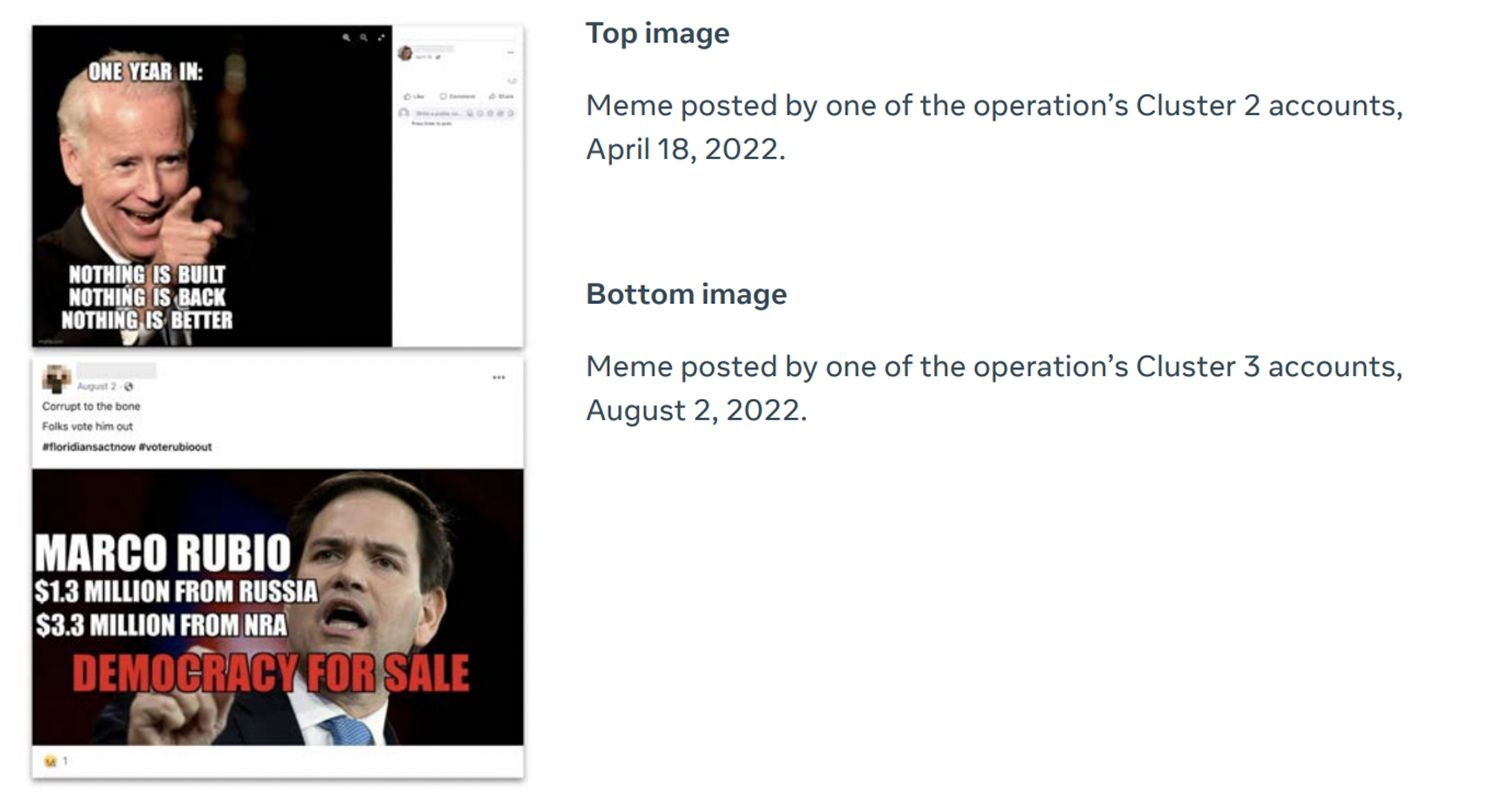Meta/Facebook says that it has discovered and removed "the largest and most complex Russian-origin operation" to influence social media users since the war in Ukraine began, as well as a separate, smaller, more inept campaign out of China.
Meta has released a new report on its efforts to combat "coordinated, inauthentic behavior" — or what they now refer to by the abbreviation CIB. The latest campaigns to be intercepted appear to be state-sponsored actors out of Russia and China, and interestingly, U.S. users appear only to be a small piece of the target pie here in terms of political influence.
The first was a "small network" that involved "four largely separate and short-lived efforts" to influence users in China, the U.S., and a few Chinese- and French-speaking audiences elsewhere in the world. For U.S. users, there seemed to be a focus on the midterm elections, with some recent posts and ads criticizing Joe Biden and the like. As seen in example screengrabs below, there was also a post calling out Marco Rubio for alleged corruption, telling Floridians to "vote him out." The company said this was the first time they'd found an influence campaign out of China focused on influencing U.S. domestic policy or elections.

"Chinese influence operations that we’ve disrupted before typically focused on criticizing the United States to international audiences, rather than primarily targeting domestic audiences in the US," writes Ben Nimmo, Meta's global threat intelligence lead and David Agranovich, Meta's "director of threat disruption."
For obvious reasons, the Russian campaign was largely focused on influencing opinion about the Ukraine war, with posts largely targeting Germany, Meta says — but also France, Italy, Ukraine, and the UK.
"The operation began in May of this year and centered around a sprawling network of over 60 websites carefully impersonating legitimate websites of news organizations in Europe, including Spiegel, The Guardian and Bild," the Meta team writes. "There, they would post original articles that criticized Ukraine and Ukrainian refugees, supported Russia and argued that Western sanctions on Russia would backfire. They would then promote these articles and also original memes and YouTube videos across many internet services, including Facebook, Instagram, Telegram, Twitter, petitions websites Change.org and Avaaz, and even LiveJournal."
Meta is calling it "the largest and most complex Russian-origin operation that we’ve disrupted since the beginning of the war in Ukraine," adding that "It presented an unusual combination of sophistication and brute force."
The team at Meta says that it repeatedly blocked domains belonging to the CIB campaign, but they would just set up new ones, "suggesting persistence and continuous investment in this activity across the internet."
The full CIB report also includes a list of domains and Telegram channels that have been connected with the campaigns, in the hopes that outside researchers will help to continue to monitor these.
Such inauthentic behavior and efforts to influence political opinion out of Russia was blamed in 2016 for helping Donald Trump win the election by the narrow margins he did in just a couple of states. In Putin's long game regarding Ukraine, he clearly saw Trump as a much more useful tool than any Democrat if and when it came time to invade. And now, looking at the activity here, he and his minions are much more focused on European public opinion as he looks, possibly, to an endgame in this war.
And China seems to still have a lot to learn when it comes to mimicking Putin's influence machine. As Meta reports, amusingly, the Chinese influence campaign "failed to gain following or engagement from authentic communities." They continue, by way of explanation, "First, this activity was very sporadic in nature: they ran a very small number of accounts in each cluster, only kept them going for a few weeks, and posted infrequently... What they did post included linguistic errors: [e.g.] “I can't live in an America on regression!”
Also, the Chinese operatives kept to "a shift pattern that coincided with a nine-to-five, Monday-to-Friday work schedule during working hours in China" which was 12 hours ahead of Florida, and they took "a substantial lunch break," which meant most of the posts went up "when Americans were sleeping."
Top image: Meme screengrabbed via Meta's report

